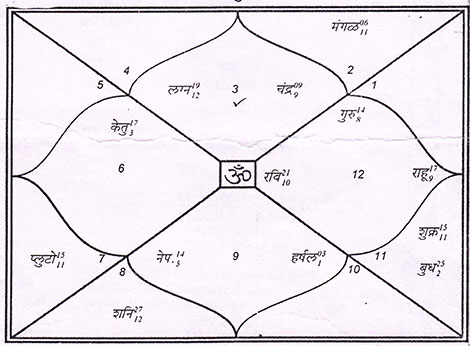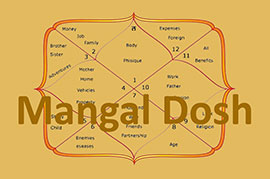+91 84278-01008
Feng Shui the ancient, 5,000-year-old Chinese Art of Placement, also known as the art and science of healing spaces, has captured the imagination of the western world. Based on lessons and the wisdom of an ancient Chinese text, the I Ching or Book of Changes, one's proper placement within the cosmological forces can support one's health, balance, sense of harmony, prosperity and thereby affect one's destiny.

The therapeutic benefit of working with feng shui principles begins with a personal conversation, an evaluation, of how one is doing with respect to the energies expressed in the I Ching and its 64 hexagrams. The fundamental energies are Water (Career), Mountain (Wisdom), Thunder (Elders/Health), Wind (Prosperity), Reputation (Fire), Relationships (Earth). Creativity/Children (Lake), Benefactors/Travel (Metal) and the tai chi, the complementary opposite forces of yin and yang in perfect balance. The goal is to create a sacred space of home where chi, the cosmic breath or life force, can flow smoothly and nourish the inhabitants.
Changes in one's physical space, particularly placement of bed, desk, and stove, can have remarkable and profound affects on one's feelings about one's sense of harmony. When changes are made with intention and clarity, a metaphor has been created for the home to be "a place for experiencing and fulfilling the meaning of existence through the fullest development of our natures."
People are out of balance with natural life. They are searching for new ways to find joy and meaning in life and to once again get grounded. "Simplify, Simplify," said Thoreau. People are coming home to the natural wonders of the world -- finding them in the garden, eating organic foods, health through natural remedies, sleeping and dressing in natural fibers, traveling to eco-sites, and preserving the natural order through land conservation and ecological awareness. They are coming home to self via different conversations. One of the conversations is about how their own space can nourish them as the world turns plastic and the speed of information boggles the mind. People are wanting to create sacred spaces of home that nurture, refresh, rejuvenate, bring joy and heal. The principles based on the ancient Chinese Art of Placement, known as feng shui, help people articulate a new conversation with themselves and to then be able to express themselves, their desires and intentions through the placements and decoration of home and workspace. When changes are made in home and workspace, people just feel better. The ancient principles of feng shui speak to peoples' intuition and qualities of observation that have been dulled by modern life, thus creating this explosion of interest in feng shui.
Feng Shui is the ecology of flow, the architecture of energy. Based on the idea good fortune results when people live in balance with their environments and their inner natures. Feng shui has been praised as an environmentally sound practice that emphasizes respecting rather than tampering with nature. Today, this ancient and intuitive idea is so forgotten as to seem revolutionary
The ancients understood that when man placed himself in perfect harmony with the cosmological forces of heaven and earth, honoring the cycles of nature, he would experience health, harmony, and balance and experience prosperity. This ancient science of positioning oneself to optimally benefit from nature's energies became known as feng shui (fung shway), meaning wind/water and is also becoming honored as the art and science of healing spaces. Feng shui studies man's connection to the cosmos and his personal placement within his physical environment and immediate surroundings. Early feng shui masters known as geomancers [(geo-earth) (mancer-study of)] used a tool known as a lo-pan (compass) to determine the cardinal directions and the "lucky directions" that would most benefit their client. In fact, the earliest geomancers helped find the most auspicious gravesite for the client to ensure the good fortune of offspring. The quality that these early feng shui masters were looking to harness was the energy of chi, a term for an invisible force that eastern cultures identify as "the cosmic breath" or life force that flows infinitely through and around our bodies, homes, town, cities, planet, and the atmosphere. Chi and how to cultivate chi, is the central focus of feng shui principles. Placed properly, one prospers. Being nourished by good chi, one heals, enjoys good health, harmony, and balance.
Man naturally seeks guidance about his condition, understanding the meaning of his life, and living in community. The Chinese culture has long referred to an ancient, 5,000-year-old text known as the I Ching, or Book of Changes, for guidance in human problem solving and seeking spiritual guidance. It discusses eastern concepts of creating harmony and balance, the polarity of yin and yang, and the five elements: Fire, Earth, Metal, Water, Wood expressed in trigrams of solid lines (yang) and broken lines (yin). Book 1 is made up of 64 different 6-lined figures or hexagrams. Each hexagram describes a specific situation and gives guidance relating to solving that life situation. The hexagrams are created by combining the eight different trigrams that were intuited by an ancient sage, Fu Hsi, about the nature of the energies of the universe. These eight essential natural forces were understood to be the yang forces of Heaven, Thunder, Water and Mountain and the yin forces of Earth, Wind, Fire, and Lake. At the center of the cycle of how the 64 hexagrams and energies combine and interact is the symbol of the tai chi, yin and yang as complementary opposites in perfect harmony and balance.
The first hexagram of the I Ching is known as "The Creative." It consists of six solid lines, the Trigram of Heaven over Heaven.
It explains that our ultimate destiny is to use this lifetime to complete within ourselves, through self-development, the true and superior image of us stored in the mind of the Deity. Thus, this life, having its full array of opposites, is a place for experiencing and fulfilling the meaning of our existence through the fullest development of our natures. As our ultimate destiny, it is also called our personal Tao.
The flexible Bagua is positioned over the client's property, then the house, and then the individual rooms to determine where the energies are located and to capture the flow of nourishing chi. The "mouth of chi," or the source of this nurturing chi, is always positioned in one of three locations -- the trigrams of Mountain (Wisdom), Water (Career) or Heaven (Helpful People). The goal is to enable the chi to enter unobstructed, flow smoothly, spiral around the entire house or workspace nourishing the occupants in the entire space.
I perceive being a feng shui consultant as being something akin to a divining rod -- helping each client to find the treasure in his own space and leading him to the grace and divinity within himself. The home can be a place to find the "fullness of the development of their nature," moving the clients toward the experience of what is their soul's purpose. The home can be a treasure map to self-fulfillment. Fill it with beauty and metaphors for goals and intentions and you keep moving forward on the treasure hunt of life. A feng shui consultant offers suggestions to help improve the flow of good chi, "sheng chi," not only to balance one's life, but to help the client move toward his expressed goals and desires, and in so doing, move him closer to the divine within him, by remembering, knowing, trusting, and listening to his own intuition. Moving something in physical space can help move one closer to understanding one's own "innerspace."
The feng shui consultant evaluates the flow of chi, analyzing external and internal factors. The factors that may interrupt this flow are such elements as an incomplete shape, suggesting areas of the house that may be missing and therefore that corresponding life aspirations thus may be compromised. Situations where chi flows too swiftly or harshly are termed "piercing arrows" "sha chi," as in long corridors, angles created by structural elements, beams, pillars, furniture corners, slanted walls and ceilings. Rooms with insufficient light or too much clutter can influence negative chi flow.
Feng shui is very forgiving and offers suggestions as "cures" to remedy bad feng shui. The cures involve placing such things as light (crystals, mirrors), heavy objects (sculptures/stones), life force (plants, fish), moving objects (chimes/flags) and transcendental cures such as bamboo flutes, as remedies. The selection and placement of these cures is part of the intuitive skill of the feng shui master but ought to be personalized to the goals and intentions of the client. We have everything we need. Feng shui helps us put it in the proper places.
Changes may involve tangible, observable and understandable cures, such as moving the bed or desk to face the mouth of chi, thus offering the client a new position of power and influence over his personal universe. However, the greater power of feng shui is in the potential of the intangible, unobservable and mystical use of cures such as hanging a crystal in the position of Earth (Relationships) to influence one's desire to attract or enhance one's relationships. When activated with intention and ceremony, there is the potential for amazing results to occur. Part of the appeal is that with the omnipresence of a technical society we are bombarded with advances beyond our ability to comprehend. We have created lifestyles that are out of balance with the natural rhythms and cycles of nature. We have created artificial days and nights. The glories and miracles of nature have been overshadowed by the miracles of modern science. The necessity to remain healthy and balanced with the stresses and stimuli of modern-day life creates a greater demand to return to a home that is a healthy place, a safe place, a refuge where we can be nourished and restored. We can create places of incredible power within our own homes when we recreate within them the perfect beauty and balance found in nature. Beginning with incorporating the colors, shapes, or qualities of the five elements, looking with feng shui eyes for piercing arrows, positioning bed and desk to face the door, so that we face life's challenges head on, and uncluttering our stuff to make room for new opportunities, is a way to begin.
We, humankind, are now remembering that man fits within a cosmic system or natural cycles, an order, a regularity and natural beauty. Feng shui helps to mirror that within our lives by making us aware of the natural energies inside our homes through color, metaphor and a smooth flow of chi, and, above all, that proper placement in home and office is not just about the position we sleep in or the position of our desk, but about where we want to position ourselves within the cosmos to most benefit from these cosmic energies. Feng shui is about coming home to the power of self at the speed of thought.
When clutter is organized and eliminated in an area of the Bagua, the space opens up for the energy to enter. When the clear intention is manifested by placing a loveseat, for example, in the relationship area (gua) of the bedroom, relationships will improve. The bedroom is all about being in relationship. Does it portray that as the sole intention of the space or do you have a desk, work books, laundry all around? If one wants quick results and change in one's life, then move something. Change the placement of bed, desk, or sofa, or make new placements with intention in the area of the bagua that corresponds to the desired energy change. You then begin to create a sacred space to nourish your soul. This is therapeutic. The cosmic order is maintained by the revolution and movement of the heavenly bodies. If we stagnate we are going against the cosmic flow of chi which is ever moving.









 +91 7087844333
+91 7087844333
 +177 83841579
+177 83841579
 +91 9417344333
+91 9417344333

Donec id elit non mi porta gravida at eget metus. Donec id elit non Vestibulum id ligula porta felis euism od semper. Nulla vitae elit libero
Need help with designing your brand new website or you have any idea and thinking of getting it’s branding done then get a FREE quote today.
Call Us +91 84278-01008 Send an Email on swami_sikander2003@yahoo.co.uk Visit Us:-First Floor,Sant Cinema Market,Old Railway Road-Jalandhar City
India
© Copyright 2019 by Horoscope. All right Reserved - Design By Sriraj